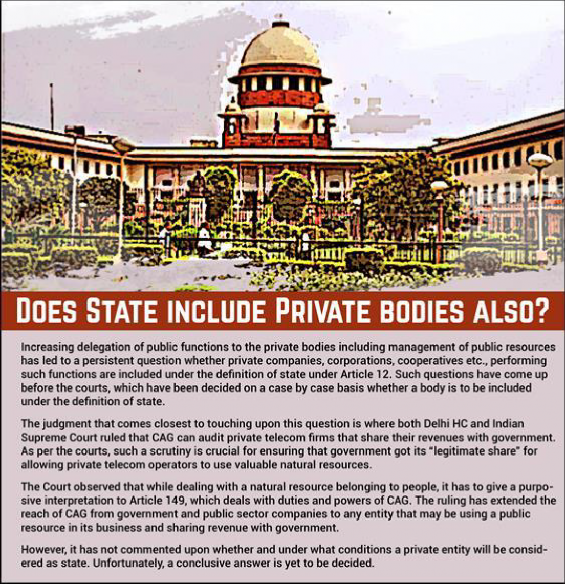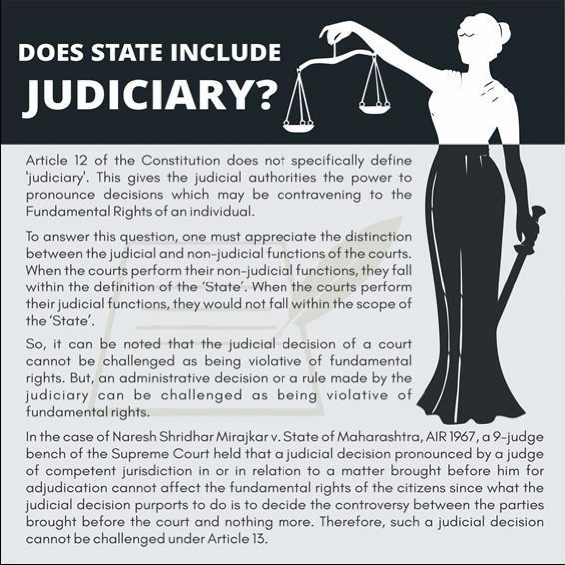6.1.2. Description
Article 12 seeks to define the scope of “State” for the purpose of Part III of the Constitution. A citizen can approach the Supreme Court on violation of Fundamental Rights by any of the bodies included within the definition of the State. In other words, for the purposes of Part III of the constitution, the state comprises of the following:
1. Government and Parliament of India i.e the Executive and Legislature of the Union
2. Government and Legislature of each State i.e the Executive and Legislature of the various States of India
3. All local or other authorities within the territory of India
4. All local and other authorities who are under the control of the Government of India
It includes the Parliament, Union Government, State legislature, State Executive, Local Authorities etc.
Local Authority: The term Local authority includes the following:
♤ Local government: According to Entry 5 of the List II of VII Schedule ‘local government’ includes a municipal corporation, improvement trust, district boards, mining settlement authorities and other local authorities for the purpose of local self-government or village administration.
♤ Village Panchayat: In the case of Ajit Singh v. State of Punjab, it was held that within the meaning of the term local authority, village panchayat is also included.
In Mohammad Yasin v. Town Area Committee, the Supreme Court held that to be characterized
as a ‘local authority’ the authority concerned must;
1. Have a separate legal existence as a corporate body
2. Not be a mere government agency but must be legally an independent entity
3. Function in a defined area
4. Be wholly or partly, directly or indirectly, elected by the inhabitants of the area
5. Enjoy a certain degree of autonomy (complete or partial)
6. Be entrusted by statute with such governmental functions and duties as are usually entrusted to locally (like health, education, water, town planning, markets, transportation, etc.)
7. Have the power to raise funds for the furtherance of its activities and fulfilment of its objectives by levying taxes, rates, charges or fees
Other Authorities: The term ‘other authorities’ in Article 12 has not been defined either in the Constitution or in the general clauses Act, 1897 or in any other statute of India. Therefore, its interpretation has caused a good deal of difficulty, and judicial opinion has undergone changes over time. Judicial pronouncements have given a wide scope to the expression “other authorities” but still the list is not exhaustive.
The functions of a government can be performed either by the governmental departments and officials or through autonomous bodies which exist outside the departmental structure. Such autonomous bodies may include companies, corporations etc.


Hence, for the purpose of determining what ‘other authorities’ fall under the scope of State,
the judiciary has given several judgements as per the facts and circumstances of different cases:
♤ In the University of Madras v. Shanta Bai, the Madras High Court evolved the principle of ‘ejusdem generis’ i.e. of the like nature. It means that only those authorities are covered under the expression ‘other authorities’ which perform governmental or sovereign functions. Further, it cannot include persons, natural or juristic, for example, Unaided universities.
♤ In the case of Ujjammabai v. the State of U.P., the court rejected the above restrictive scope and held that the ‘ejusdem generis’ rule could not be resorted to the in interpreting ‘other authorities’. The bodies named under Article 12 have no common genus running through them and they cannot be placed in one single category on any rational basis.
♤ In Rajasthan Electricity Board v. Mohan Lal, the Supreme Court held that ‘other authorities’ would include all authorities created by the constitution or statute on whom powers are conferred by law. Such statutory authority need not be engaged in performing government or sovereign functions. The court emphasized that it is immaterial that the power conferred on the body is of a commercial nature or not.
♤ In the case of R. D. Shetty v/s International Airport Authority, the Court laid down five tests for a body to be considered “other authority”:
o Entire share capital is owned or managed by State.
o It enjoys monopoly status.
o Department of Government is transferred to Corporation.
o Functional character is governmental in essence.
o Deep and pervasive State control.
